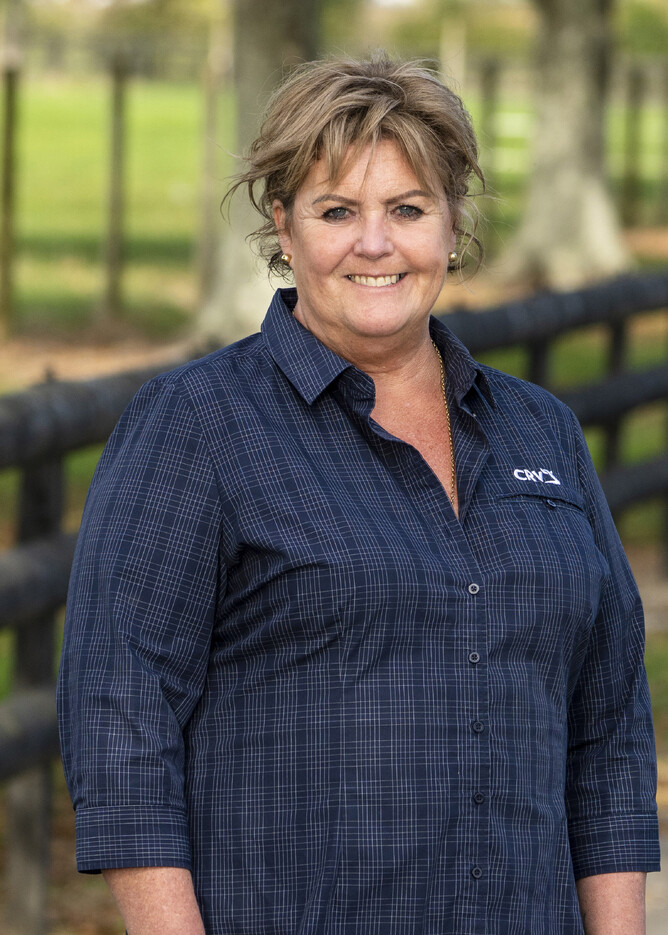That’s the philosophy of CRV’s new Regional Sales Manager for the Upper North Island, Michelle Bratty. She likes farmers. Likes to see them do well and loves being part of a company that shares her zeal for helping people succeed.
“I’m passionate about farmers because I’ve been one. Only for a short time, but I know how hard it is to keep that bottom line from sinking. It’s a constant battle to get the best out of your herd, so I’m thrilled to be in a company that helps farmers do that.”
The “short” stint Michelle refers to is her time on a farm in New South Wales, Australia. Born in Upper Hutt and schooled in Auckland, she wasn’t born and bred on the land. But Michelle (55) has been attracted to rural life for as long as she can remember.
“I’d always wanted to be in farming. Something about the lifestyle appealed to me. A few years ago, a friend offered me the opportunity to work on a farm in Australia. I’d done agricultural studies and had specialised in dairy production, so I jumped at the chance to live that out on the land.
“I became the assistant manager and worked in every aspect of farming. Driving tractors, milking, inseminating cows and pulling out calves. I took it all on and felt at home.
“Until the accident.”
In June 2011, severe rains hammered the Dorrigo district in New South Wales, causing a series of flash floods. Michelle was on her way to get the herd in for milking when the floodwaters rushed through the farm and was caught in the surge. The current carried her for over 2 kilometres, dragging her through posts and trees until she finally landed safely in a neighbouring field. Her legs and arms were broken.
After six months of recovery, Michelle returned to the farm but was unable to cope with the physical workload. That’s when she turned to a different sphere of farming: animal breeding. Michelle explains the move.
“I’d learned a lot about animal breeding during my studies, so I decided to pursue it as a career. It was a way to stay involved with farming. After working for several breeding companies in Australia, I came back home to New Zealand and found my place at CRV.
“At CRV, I manage a team of 10 field consultants. Their job is to help farmers tap into the exceptional genetic solutions and products offered by CRV, and my job is to give our field team everything they need to succeed in that.
“Providing training is probably my most important contribution. It’s kind of like developing a rugby team. One training session won’t help much on game day, but if you train often, you’ll be better when it counts. I take the same approach with my team.
“We care a lot about farmers, so I make sure we’re giving them the best genetic solutions and products to help their herds reach full potential. That’s why I run refresher training sessions.”
Behind Michelle and her field team is a vast resource of knowledge and experience. CRV has its own experts in breeding programming, progeny testing, on-farm data sourcing, herd testing, as well as DNA and artificial breeding specialists. Every area of dairy herd improvement covered.
Michelle believes that the more her team can tap into these resources, the better they’ll be at helping farmers.
“Our team don’t need to be specialists; they just need to understand the big picture, what goals the farmer is trying to achieve and how CRV can help. If specialist advice is required, they can take a CRV expert out to the farm with them. We have these brilliant people on call – my job is to help my team use these resources.”
There are two other skills that Michelle is training into her people. The first is cold calling.
It’s not easy walking up a farmer’s driveway to start a conversation about herd improvement. Many struggle with the feeling that they’re interrupting people, but Michelle sees it differently.
“I want my field team to enjoy that driveway walk. I know I would! That’s because I’m absolutely confident that CRV can make big improvements in a herd’s performance and the farmer’s bottom line. It’s my job to help my team feel good about that, to know that even if they show up unannounced, they’re making life better for someone.
“The other skill our team needs is empathy, the ability to really understand someone else’s situation. I developed empathy from running the family violence unit in the Rodney District police force. I heard some tragic stories, and I learned to listen and read the person sharing their life with me. It’s an emotional intelligence skill.
“We need that when we’re with farmers. They have goals they’re trying to reach, and obstacles that frustrate them. Our first job is to make them feel heard. Once we’ve understood their situation, we can give them the breeding resources that fit.
“There’s so much we can offer. I’ve worked in a few breeding companies, but I’ve never seen anyone do the amount of research that CRV does to offer the best genetics. They truly are passionate about supporting farmers.

